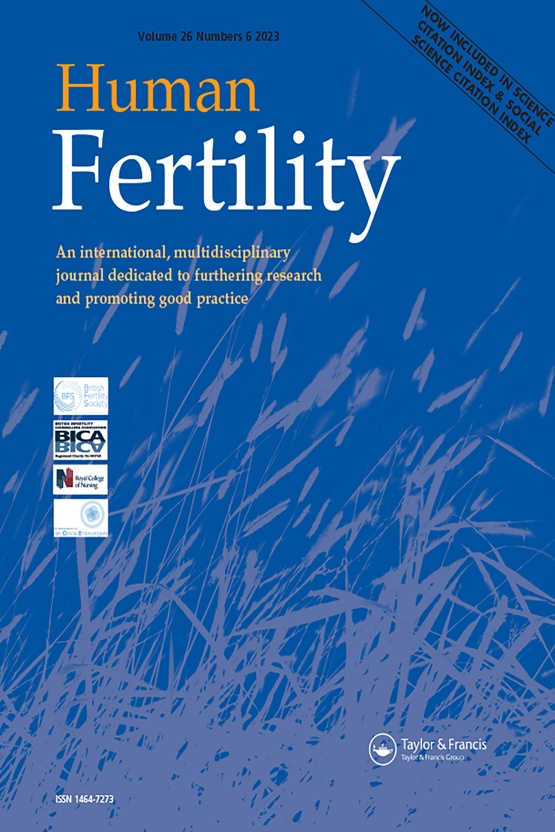Submit a Manuscript to the Journal
Human Fertility
For an Article Collection on
Advances in Reproductive Science and Medicine: How Does Society Respond?
Manuscript deadline
25 October 2024


Article collection guest advisor(s)
Ms. Sarah Norcross,
Progress Educational Trust
[email protected]
Mr. Sandy Starr,
Progress Educational Trust
[email protected]
Advances in Reproductive Science and Medicine: How Does Society Respond?
Forty years ago, the Warnock Report – commissioned by the UK Government – helped set the terms on which assisted conception and embryo research would be regulated, weighing up different perspectives and taking account of public hopes, concerns, and sensitivities. As well as shaping the law in the UK, this report also influenced regulatory and ethical thinking around the world. Today, rapid advances in reproductive science and medicine – together with official recognition of various non-traditional family forms – pose new regulatory and ethical questions and can elicit diverging public views. How are different societies and institutions keeping up with and responding to the latest developments? What issues are giving rise to the greatest tensions? And what are the prospects for establishing common ground?
Throughout history, reproduction – and latterly, assisted conception – has been among the most contentious areas of human existence, creating new possibilities for the exercise of autonomy while challenging established assumptions and values. IVF was initially controversial and disruptive but went on to become an accepted part of mainstream medicine. However, a recent ruling by Alabama's Supreme Court – to the effect that cryopreserved human embryos have the same legal status as children in that state – has served as a reminder that legal arrangements enabling assisted conception cannot be taken for granted and may need to be defended anew. Meanwhile, advances in the science of human development and reproduction – including extended embryo culture, the possibility of in vitro gametogenesis and the creation of increasingly sophisticated stem-cell-based embryo models – are destabilizing the very concepts and categories on which regulation depends, creating a need for new and nuanced thinking.
This Article Collection will explore society's response to advances in reproductive science and medicine, including the following aspects:
Legal and regulatory
- What precedents are being set?
- How do jurisdictions compare?
- What established assumptions and concepts are being placed under greatest pressure?
Policy
- What factors and influences shape policy thinking in this area?
- How do policies and campaigns in this area relate to decreasing fertility rates and declining population sizes, nationally and globally?
Sociological and psychological
- What developments in this area provoke the greatest divergence of views and why?
- Are prevailing views of life, personhood, parenthood, or family changing, and if so, then how?
- What are the most fruitful approaches to investigating what people think and know?
Historical
What can the Warnock Report, and the circumstances that led to and resulted from it, tell us 40 years later?
Sarah Norcross is Director of the Progress Educational Trust – a charity that improves choices for people affected by infertility or genetic conditions – and she frequently represents PET in the national and international media. Sarah is also a Trustee at the British Fertility Society and an External Adviser to Cambridge Reproduction, and she serves on the National Infertility Group convened by the Scottish Government. Previously, she worked as a Barrister.
Sandy Starr is Deputy Director of the charity Progress Educational Trust. Sandy also serves on the Oversight Group of the project Governance of Stem-Cell-Based Embryo Models, and he is author of the pamphlet AI: Separating Man from Machine. Previously, he served on the working groups that produced the UK clinical practice guidance Ethical Issues in Prenatal Genetic Diagnosis and Prenatal Diagnosis and Preimplantation Genetic Testing for Germline Cancer Susceptibility Gene Variants.
Disclosure Statement: Ms. Norcross and Mr. Starr declare no conflict of interest regarding this work.
Benefits of publishing open access within Taylor & Francis
Global marketing and publicity, ensuring your research reaches the people you want it to.
Article Collections bring together the latest research on hot topics from influential researchers across the globe.
Rigorous peer review for every open access article.
Rapid online publication allowing you to share your work quickly.
Looking to Publish your Research?
Find out how to publish your research open access with Taylor & Francis Group.
Choose open accessSubmission Instructions
All manuscripts submitted to this Article Collection will undergo desk assessment and peer-review as part of our standard editorial process. Guest Advisors for this collection will not be involved in peer-reviewing manuscripts unless they are an existing member of the Editorial Board. Please review the journal Aims and Scope and author submission instructions prior to submitting a manuscript.